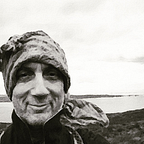The low spark of low-heeled boys
I woke up in the Emergency Room. St. Anne’s Hospital. Where I was born. My mother and my sister were in the room. I still remember the nurse. “Is he a user?” I’d passed out and fell backward onto the sidewalk and hit my head full on. As I lay there, writhing and convulsing, my girlfriend called an ambulance.
I had a bit of a secret. Poorly kept. The situation was delicate, touch and go. I conjure up an image of my teenage self sprawled out on a lawn, at some outdoor concert, half conscious. Don’t know what this bird flew into, but shit don’t look good. The world was spinning faster and faster. Try and keep up. High-school in New England. A mean, beat down, beaten up, mill town south of Boston. Cramped tenements. Chain link fences. Small bore gangs of Irish, Poles, Portuguese. A lost American city. Lost American boys.
Croke was tall, lanky, dispirited. A lad in a brown leather jacket and jeans, with shoulder length, dirty blond hair. I can’t remember Croke being much of a threat to anyone but himself. Croke loomed large at school and on the street. Mainly because he had a monster heroin habit. More than once, I saw Croke being dragged down the hall, his arms around the shoulders of two burly teachers, his feet dragging behind him. Eyes rolling around in his head. They struggled to get him out of the building, down the stairs and stuffed into a cab. Next day they would do it all again.
Dope was easy to get. Like buying a bag of chips. Like whistling at a pretty girl. Dope was language. Fuck you, it said. The men’s bathroom in high-school was part of the franchise. Mom’s sandwich baggies filled with Tuinal, Seconal, Quaaludes, heroin, speed. The cost was low — lunch money low. You could get anything you wanted at Tadeusz Kosciuszko Square five minutes from my house. The Square. At the Square, you could buy your way into your own imprisonment beneath a statue of a Polish hero of the War of Independence. The irony was lost on us. We weren’t interested in independence. Ours was a more noble conflict — obliterate the self. That stealth army spreading a miracle of warmth across your tender groin, courtesy of Adolph von Baeyer, inventor of the barbituate. Just take me out, Adolph. Across from the Square was Joe Gow’s, where you could get a greasy chow mein sandwich in wax paper and a coke for two-fifty, when you resurfaced and got hungry.
Killer Cabral. I don’t know if Killer had killed anyone when I knew him, but the chances are good, or got around to it in due time. I have one memory of Killer. I’ve got my mother’s car for the night. I’m seventeen. Killer is in the back seat — this is an eight-cylinder Oldsmobile Cutlass, maroon. A machine. I’ve disconnected the odometer. Killer is small. In a black leather jacket. His street rep is fearsome. Killer Cabral is in my car. He’s cooking junk in a spoon. He’s got his works out. Rolls up a sleeve. Ties off, finds a vein. Pushes the needle in. Tilts his head back for a second, eyes closing… Come to daddy.…that’s it. Then, Killer is out. Into the night. Hey, Killer Cabral was in my car last night. No way. Way.
For a while, my best friend was Fat Larsch. Toothpick thin. Stringy blond hair. We were tight for three years. Concerts, camping, ski trips, open-faced turkey sandwiches and mashed potatoes at the counter at Rockland Diner. Quarts of Bud. All the shit that kids do. Add weed, downers, and the occasional speed. I never once set foot inside his house. Some kind of weird trouble was going down in that darkened third-floor apartment. Finally, Fat Larsch went for the needle. He died of an overdose. By then, he’d become a respiratory technician at the local hospital. St. Anne’s. I never went to the funeral. I never went for the needle. That was a line I wouldn’t cross.
I woke up in the Emergency Room. Tied it off. All the people who were part of the old world, over. I passed them on the street. I did not meet their eyes. I did not speak. No hellos, no how you doing. I don’t see you.
Low-heeled boy had a dream — a wanting. It was so bonkers, so outlandish, and freakish, and buried so deep, it would take over four decades to dig it out. Wanted that mother so hard, had to wrap that fragile thing in blankets and shame and lies and foolish loves and silence.
Touch and go.
